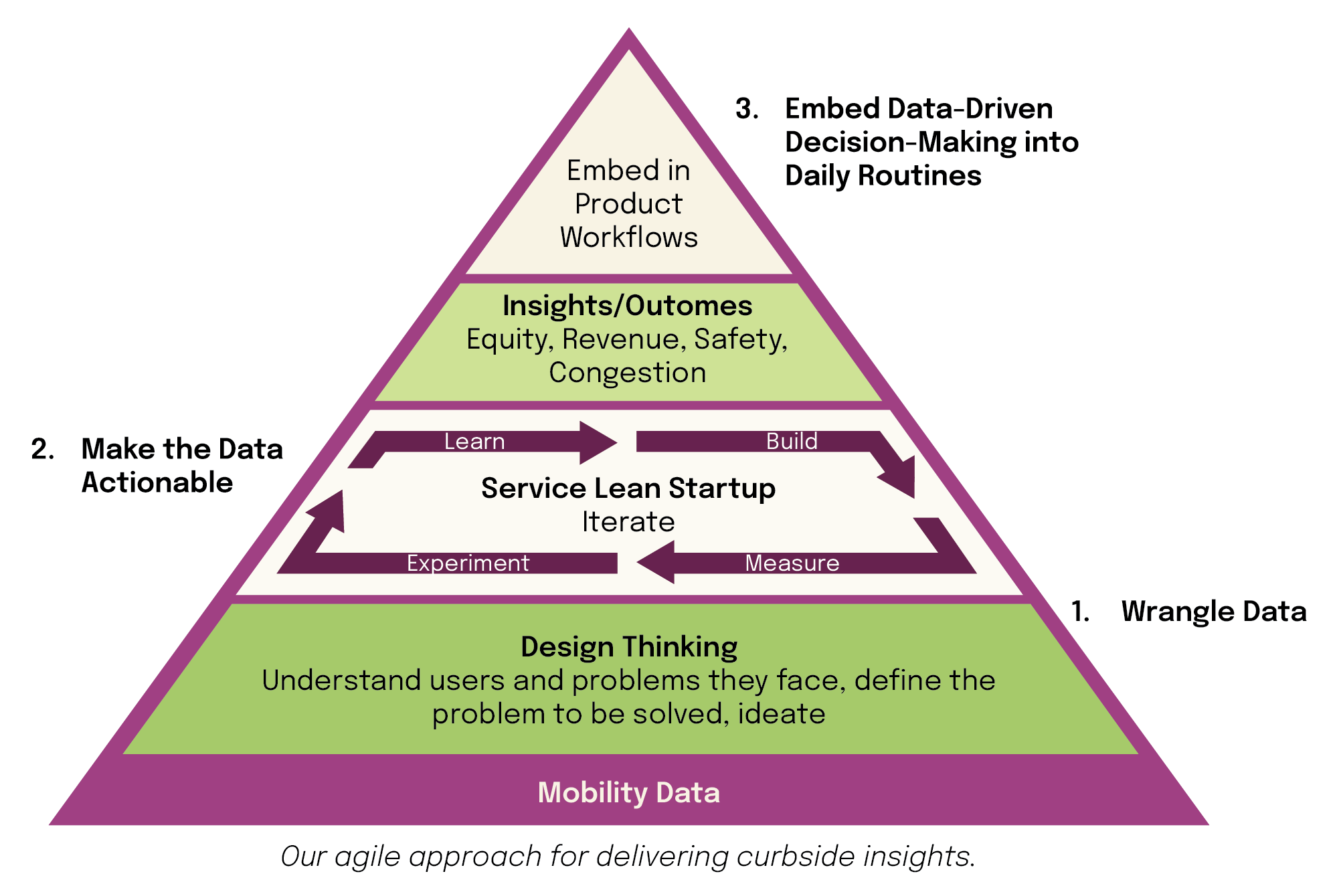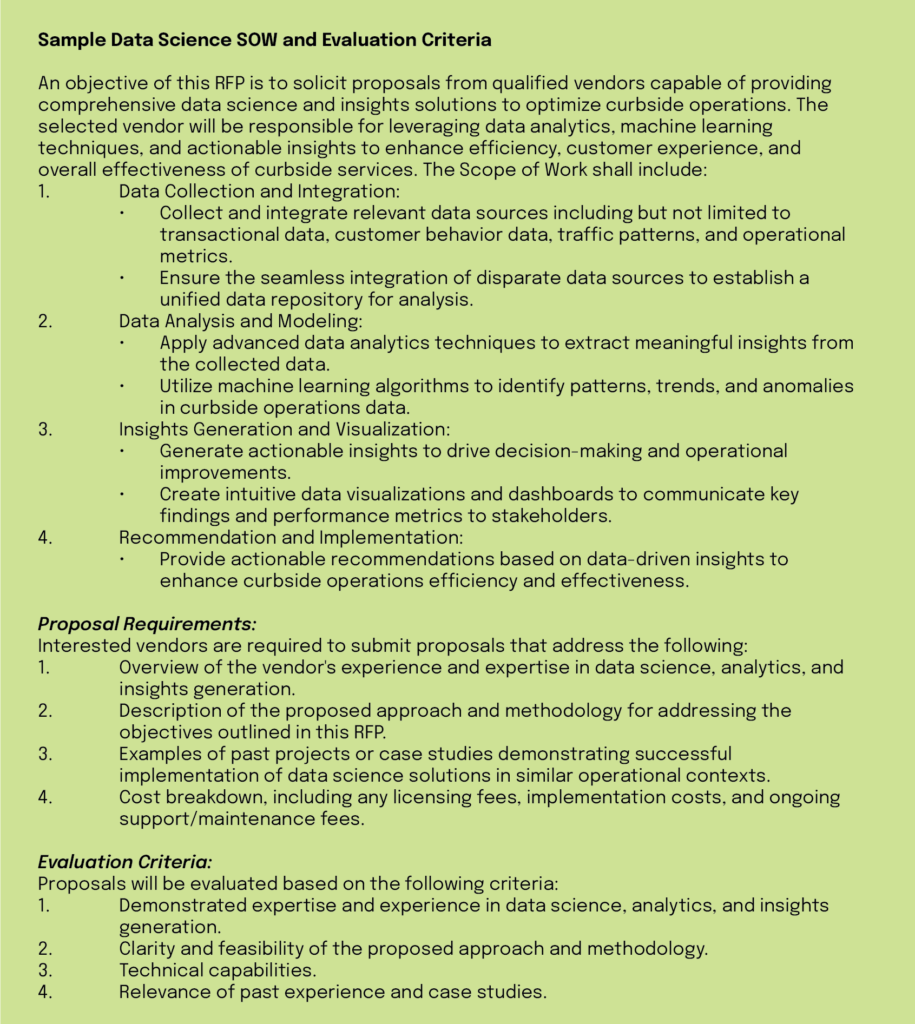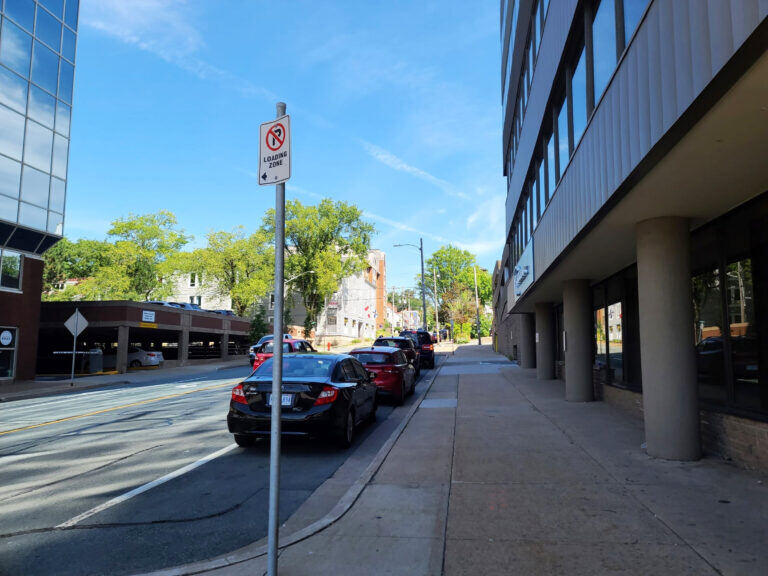4 min read
Curbing Chaos: Navigating Data Science Procurements to Improve Curb Use
Mary Martin Oct 28, 2024 12:00:00 AM

As cities strive to enhance safety, increase parking turnover, and promote curbside equity, the role of data science becomes increasingly vital. Beyond mere data visualizations, actionable insights derived from data can transform curb management by effectively managing peak parking demand, allocating loading zones, reducing congestion, realigning fines, and making enforcement, booting, and citation adjudication fairer. However, implementing these data-driven solutions is no small feat. Cities aiming to foster a data-driven culture encounter various challenges, but these hurdles can be effectively addressed by procuring specialized data science expertise, as detailed below.
| Challenge | Trellint Benefits |
|---|---|
| A lack of expertise | Trellint data scientists have advanced degrees in machine learning, electrical engineering, and data science, as well as training in computer vision and AI. |
| Poor or inconsistent data | Data scientists are trained to breakdown operational silos, analyze homogeneous and heterogeneous data sources, and build proxies to reduce data collection costs. |
| Budget constraints | Rather than hire new staff and invest in data science platforms, cities can engage with data scientists hourly to foster a dynamic, responsive, and sustainable model for data science projects. Trellint’s agile data science approach, as outlined below, provides flexibility, continuous improvement, risk reduction, ongoing collaboration, and stakeholder engagement. |
| Competing priorities | City officials deal with multiple responsibilities, making it a challenge to find the time to prioritize data science. Trellint data scientists focus on one thing: improving curbside management with data. This focus breeds familiarity with data and methodologies, allowing us to drastically reduce the timeline to deliver insights. Typically, data scientists spend about 80% of their time “wrangling data” (collecting data, understanding data, cleansing data, etc.). Our experience enables us to reduce the wrangling effort to about 10% to 20% of our data science engagements. |
| Bias and heuristics | Data scientists are objective. The data and ongoing vigilance, not preconceptions, inform curbside recommendations. |
| Access to data | In addition to trend data across multiple clients, Trellint captures heterogeneous data to provide richer insights and enhance decision-making. By studying traffic data (vehicle speeds, counts), public transit data (ridership), weather, events, land use/zoning, social media feedback, etc., data scientists can ensure their policy recommendations deliver on client objectives. |
| Defining success and measuring the impact | Applying an iterative approach to data science, as well as a feedback loop for continuous improvement based on insights, can help cities measure and baseline success. |
While the path to implementing data science in curb management is fraught with challenges, these obstacles can be effectively navigated by leveraging specialized expertise and an agile methodology to unlock the transformative potential of data science.

We need data scientists. Now what?
While procurement processes vary across cities, there are a variety of ways to purchase data science services. Exploring these alternatives, cities can enhance their flexibility and responsiveness, ultimately leading to more effective curb management and urban planning.
Utilizing an existing contract. If city officials are pleased with a provider’s current performance, they may seek to add data science in support of the scope of an existing agreement or, alternatively, amend the agreement.
Professional services agreement. Professional services procurements, including the provision of data science, are often treated differently due to their unique nature. A professional service procurement is best suited when seeking a vendor with a proven track record and specific expertise.
Sole source approval. The difference between a professional services purchase and sole source procurement is somewhat nuanced. Generally, a professional services procurement refers to buying specialized services from a qualified professional, like data science consulting, where the focus is on expertise and vendor qualifications. Sole source procurements, on the other hand, refer to buying a product or service from the only available supplier because there are no viable alternatives. Differentiators may include unique platforms, specialized algorithms, or proprietary methodologies. Time sensitivity is often a factor, and some cities allow for sole source agreements when piloting critical new capabilities.
RFP. If urgency is less of a concern, a formal RFP process may best suit the needs of a city seeking data science expertise. RFP’s set forth project objectives, a statement of work (SOW) and expected deliverables, and detailed evaluation criteria, including experience supporting urban data science projects, technical expertise, and integration capabilities. A request for curbside data science support could look like this:

Using direct source agreements is particularly effective for a field like data science where specialized knowledge is crucial for success. Professional service and sole source agreements can streamline the procurement process and allow cities to access necessary expertise quickly. However, these procurement tools require justification and oversight to maintain transparency.
Where’s the Funding?
Contracting with data scientists can offer several benefits and significant savings compared to hiring municipal resources. While data scientists can command competitive salaries, contracting for professional services enables cities reduce costs significantly. Data science consultation is generally provided on an hourly basis, with clients establishing thresholds for scope, hours, and timeframe. Further, contracted services are often insulated from the layoffs, hiring freezes, staff reallocation, and furloughs stemming from budget cuts and economic downturns.
While the societal need for curbside data science is generally enough to justify the expense (improved safety, reduced inequity), the return on investment from a data science engagement almost always is positive. In addition, data scientists can help reduce operational costs by improving workflow and efficiency.
There are also opportunities for data science providers to share in the risk. Rather than funding a project exclusively through an hourly rate or project-specific fee, consultants may be open to sharing in the improved revenues and/or savings realized by clients. For instance:
| Data Science Engagement | Contributory Funding Source |
|---|---|
| Curbside demand pricing | % of improved meter revenue |
| Optimized enforcement scheduling, allocation, and routing | $ per additional citation issued or % of improved collection revenue |
| Improved collections | % of collected revenue or cost savings |
| Hearing optimization | % of administrative cost savings |
| Improved citation accuracy, data integrity | % of improved revenue |
| Fine optimization | % of improved collection revenue |
By leveraging these ideas, cities can create a sustainable ecosystem that continuously funds and enhances curbside management through data-driven insights.
Conclusion: A Call to Action.
In conclusion, by leveraging these procurement strategies, cities can unlock the full potential of data science to revolutionize curb management. This proactive approach not only enhances traffic flow and optimizes resource allocation but also fosters greater equity and accessibility for all users. Ultimately, embracing data science will empower cities to create smarter, more responsive urban environments that meet the needs of their communities now and into the future.




